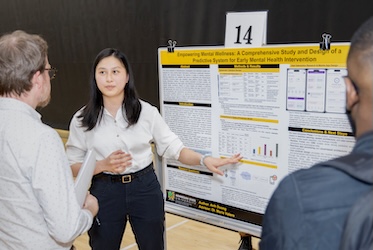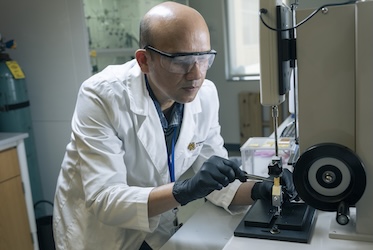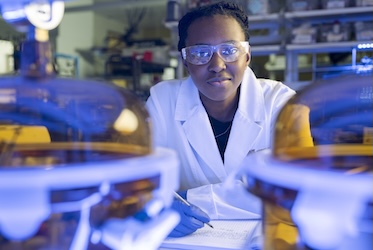
KSU researcher awarded NIH grant to improve gene-editing technology delivery
KENNESAW, Ga. | Dec 13, 2018
Work may help increase use of gene therapy in disease treatment
Kennesaw State University researcher Daniel Morris recently received a three-year $403,000 grant from the National Institutes of Health to improve the delivery of protein therapeutics and the CRISPR/Cas gene-editing technology to living cells.
CRISPR (Clustered Regularly Interspaced Short Palindromic Repeats)/Cas is a rudimentary immune system found in bacteria that protects the bacteria by saving a piece of the invading viral gene to detect future infections. This gene-editing technology has been adapted for use in gene therapy because of its accurate manipulation of genetic material.

Morris, associate research professor of biology, explained that gene modification can be difficult in tissues and organs of living patients because current practices of delivering the gene-editing technology such as CRISPR/Cas are limited in scope. Usually the cell-penetrating peptides (CPPs) responsible for carrying the cargo of gene-edited DNA or protein therapeutics can get trapped in undesired locations of the cell.
His research is focused on attaching a CPP-adaptor protein to the cargo of the critical DNA or protein therapeutics. Upon entering the cell membrane, the CPP-adaptor protein would release the cargo into the cell interior before getting trapped in an undesirable location.
“With general utility and low toxicity, CPPs are a potentially transformative technology,” Morris said. “This NIH grant will not only help significantly expand the utility of the CRISPR/Cas gene editing technology in gene therapy, but also validate that our CPP technology is an adaptable tool for delivery of a wide array of macromolecules, potentially improving the delivery of biomolecular therapeutics to treat a variety of disorders.”
“We were fortunate to be able to attract a researcher of Dr. Morris’ stature to KSU. He brings a rigorous but innovative perspective to our work,” added Jonathan McMurry, associate vice president for research, who collaborates often with Morris on other projects.
–Joëlle Walls
Photos by David Caselli
Related Stories

Passions spark innovation at Kennesaw State Symposium of Student Scholars

Kennesaw State researcher tackling sustainability through use of transparent wood

Kennesaw State students to present research at Symposium of Student Scholars

Chemistry student engaged in sustainable catalyst research through Kennesaw State's First-Year Scholars program
A leader in innovative teaching and learning, Kennesaw State University offers undergraduate, graduate, and doctoral degrees to its more than 47,000 students. Kennesaw State is a member of the University System of Georgia with 11 academic colleges. The university’s vibrant campus culture, diverse population, strong global ties, and entrepreneurial spirit draw students from throughout the country and the world. Kennesaw State is a Carnegie-designated doctoral research institution (R2), placing it among an elite group of only 8 percent of U.S. colleges and universities with an R1 or R2 status. For more information, visit kennesaw.edu.














